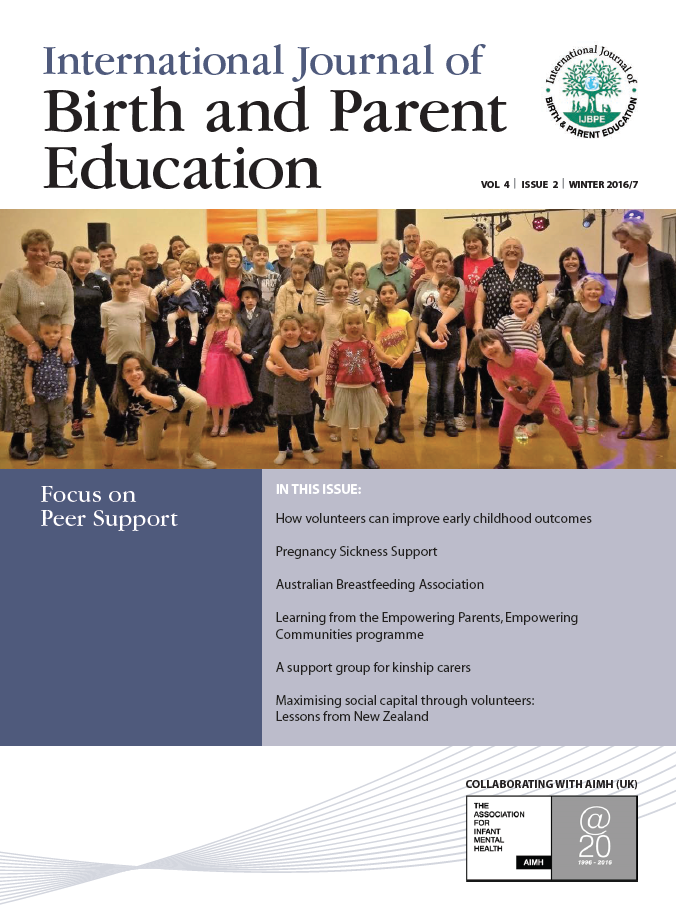Vol 4 Issue 2

Focus on Peer Support
IN THIS ISSUE:
- How volunteers can improve early childhood outcomes
- Pregnancy Sickness Support
- Australian Breastfeeding Association
- Learning from the Empowering Parents, Empowering Communities programme
- A support group for kinship carers
- Maximising social capital through volunteers: Lessons from New Zealand
Author: Kathleen Hodkinson, Tara Acevedo, Katrin Kristjansdottir
Author title: Kathleen Hodkinson, Assistant Professor of Psychology; Tara Acevedo, Researcher; Katrin Kristjansdottir, Director of Counseling Centre
Description: This editorial considers how polarized advice about the ‘best way’ to parent risks confusing parents and leads to inconsistent parenting practices.
Description writer: Kathleen Hodkinson, Assistant Professor of Psychology, Webster Vienna Private University; Tara Acevedo, Researcher, Webster Vienna Private University; Katrin Kristjansdottir, Director of Counseling Centre, Webster Vienna Private University
TAG: Parenting
Author: Alison Prowle, Janet Harvell
Author title: Alison Prowle, Senior Lecturer; Janet Harvell, Senior Lecturer
Description: This editorial draws on the authors’ experience of working at the Dunkirk refugee camp and discusses the challenges that parents face.
Description writer: Alison Prowle, Senior Lecturer, Centre for Early Childhood, University of Worcester, UK; Janet Harvell, Senior Lecturer, Centre for Early Childhood, University of Worcester, UK
TAG: Parenting
Author: Jenny McLeish, Leila Baker, Celia Suppiah
Author title: Jenny McLeish, Research Associate, Institute for Voluntary Action Research; Leila Baker, Head of Research, Institute for Voluntary Action Research; Celia Suppiah, CEO, Parents 1st
Description: A 2015 review carried out in the UK explored whether and how volunteering and peer support can contribute to improving key child development outcomes for children aged 0-3: social and emotional development, communication and language development, and diet and nutrition. It found evidence that volunteers can have a positive impact on all three outcomes, both directly and indirectly. This article summarises the strengths and weaknesses of different models of volunteering, how volunteers can engage with families who are ‘hard to reach’ for professionals, the key features of successful volunteer programmes, and the importance of volunteers working alongside professionals.
Description writer: Jenny McLeish, Research Associate, Institute for Voluntary Action Research; Leila Baker, Head of Research, Institute for Voluntary Action Research; Celia Suppiah, CEO, Parents 1st
Author: Crispin Day, Catherine Kearney, Fiona Squires
Author title: Crispin Day, Head CAMHS Research Unit; Catherine Kearney, Specialist Trainer, National EPEC Unit; Fiona Squires, Hub Lead, National EPEC Unit
Description: This paper describes Empowering Parents, Empowering Communities (EPEC), a group-based peer intervention that offers structured parenting support. It summarises the rationale, content and methods of EPEC and highlights critical features for its success as a peer-led approach as well as some of the challenges involved.
Description writer: Crispin Day, Head, CAMHS Research Unit, Institute of Psychiatry, King’s College, London, Head, Centre for Parent and Child Support, South London & Maudsley NHS Foundation Trust, Visiting Professor, Royal Holloway, University of London; Catherine Kearney, Specialist Trainer, National EPEC Unit, South London & Maudsley NHS Foundation Trust; Fiona Squires, Hub Lead, National EPEC Unit, South London & Maudsley NHS Foundation Trust
Author: Vikki Raymond
Author title: Children’s Centre Manager
Description: The author has been managing Children’s Centres within Devon, UK, since 2009. In 2013, her role altered to encompass the management of Centre volunteers which fuelled her interest in how Centres could best harness their experiences and knowledge. She began to explore Child and Parent Centres in Western Australia and Early Years Services Hubs in New Zealand. This article focuses on a model of parents as volunteers who pass on guidance and information to new parents to create a sustainable community model for parent support.
Description writer: Vikki Raymond, Children’s Centre Manager, UK
Author: Nicola Stobbs, Alison Prowle
Author title: Nicola Stobbs, Lecturer; Alison Prowle, Senior Lecturer
Description: A definition of the term ‘kinship carer’ is not easy to pin down. In Western countries, the word ‘kin’ is generally associated with biogenetic inheritance: shared blood. In other parts of the world, ‘kin’ is interpreted more flexibly and concerns ‘clanship’, where children may be brought up by godparents, friends and neighbours as well as family (Nandy et al., 2011). It is a term which is becoming increasingly recognised as the needs of this group of people come to the attention of politicians, multi-professionals and the general public.
Description writer: Nicola Stobbs, Lecturer, Institute of Education, University of Worcester, UK; Alison Prowle, Senior Lecturer, Centre for Early Childhood, University of Worcester, UK
TAG: Parenting
Author: Susan Tawia
Author title: Manager, Australian Breastfeeding Association
Description: The Australian Breastfeeding Association’s vision is that breastfeeding should be recognised as important by all Australians and become the cultural norm. Its mission is to be Australia’s leading authority on breastfeeding and to support, educate and advocate for a breastfeeding inclusive society. This article explores the history of the Association, how its peer supporters are trained and the work in which it is currently engaged.
Description writer: Susan Tawia, Manager, Breastfeeding Information and Research, Australian Breastfeeding Association
Author: Caitlin Dean
Author title: Chairperson of Pregnancy Sickness Support
Description: Pregnancy Sickness Support is the only UK charity providing information and support to women affected by nausea and vomiting in pregnancy (NVP) and hyperemesis gravidarum (HG). The charity runs a nationwide peer support network, annual conferences and education for healthcare professionals. Referring women affected by NVP and HG to the charity for support can reduce social isolation and improve pregnancy outcomes.
Description writer: Caitlin Dean, Chairperson of Pregnancy Sickness Support
